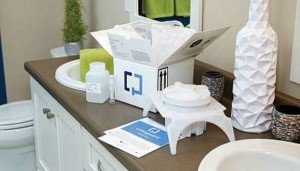
“Typically, people have symptoms of abnormal pain in conjunction with diarrhea when they have microscopic or collagenous colitis,” says gastroenterologist Sander R. Binderow, MD.
“If a physician looks at the colon, it appears to be normal, but if the patient continues to have problems, the doctor will likely take random biopsies, which are sent to a lab and come back with results showing the lining as abnormal, which is called mucosa,” says Dr. Binderow, who’s with Atlanta Colon & Rectal Surgery.
“Cramps are the same with both diarrhea and microscopic colitis. The level of pain is not associated with the difference between regular diarrhea and colitis.
“Symptoms of microscopic colitis are less abnormal than obverse or gross colitis.”
Sometimes, cramps can get really bad preceding the voiding of diarrhea.
Dr. Binderow explains, “Any colon or bowel pain is due to distension, which is when the colon is distended due to extra air.
“Colitis, or inflammation itself, does not cause any extra or extreme pain; it’s distension due to more air in the colon that can cause pain.”
Microscopic colitis is NOT a risk factor for colon cancer, no matter how painful the cramps.
Symptoms of colon cancer, that are not shared with microscopic colitis, are as follows: blood in the stools, unexplained weight loss, a persistent feeling of malaise, unexplained fatigue, abdominal pain that’s not related to diarrhea or BMs, feeling you still have to void BMs even after you “got everything out,” pencil-like stools, and constipation that alternates with diarrhea.
If you have any of these symptoms, you should see a gastroenterologist, who may recommend a colonoscopy as a diagnostic tool.
But if you’re free of symptoms and simply want to be screened for colon cancer, you can take an at-home colon cancer screening exam called Cologuard.

Cologuard
Your sample will then be analyzed for abnormal cells using the latest DNA technology.
If the cells are atypical, a colonoscopy will be recommended.
 Dr. Binderow performs minimally invasive, robotic and laparoscopic surgery for Crohn’s disease, ulcerative colitis, colon cancer and other colorectal conditions. Adept at routine procedures, he also sees patients with complex, atypical maladies.
Dr. Binderow performs minimally invasive, robotic and laparoscopic surgery for Crohn’s disease, ulcerative colitis, colon cancer and other colorectal conditions. Adept at routine procedures, he also sees patients with complex, atypical maladies.
 Lorra Garrick has been covering medical, fitness and cybersecurity topics for many years, having written thousands of articles for print magazines and websites, including as a ghostwriter. She’s also a former ACE-certified personal trainer.
Lorra Garrick has been covering medical, fitness and cybersecurity topics for many years, having written thousands of articles for print magazines and websites, including as a ghostwriter. She’s also a former ACE-certified personal trainer.
.











